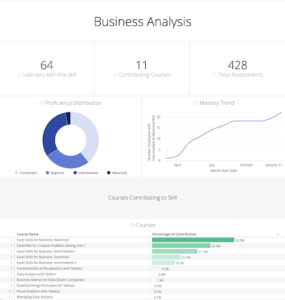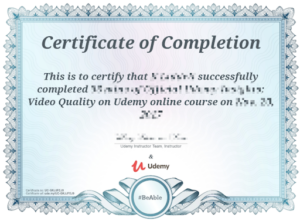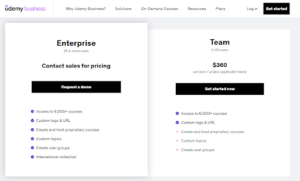Whether it’s learning new technologies or bridging skill gaps, the need for business learning management systems (LMS) is more crucial than ever. Traditional training methods no longer suffice, so it’s imperative that companies address the diverse learning needs of employees and help them upskill to achieve success.
Corporate LMS or LMS for business reduces training costs for employers, saves time for trainers, helps HR create individual learning plans that engage employees, and provides metrics to measure training effectiveness. Let’s compare two top LMS platforms: Udemy vs. Coursera.
Udemy is a massive online open course (MOOC) provider and a leading e-learning platform. Udemy for Business is an enterprise-grade platform designed for companies of every size; from small, medium, and large businesses to non-profit and government organizations.
Udemy offers pre-made courses in a variety of business and technical topics, ranging from design and IT to leadership, marketing, human resources, and stress management. In addition to a curated content catalog, organizations can also create and deliver their proprietary content to the employees in a secure learning space.
Coursera collaborates with over 200 leading universities and organizations to provide affordable and job-relevant learning to employees and organizations. Coursera offers over 5550 online courses and specializations, over 30 degrees, and 60 certificates in its content library.
Coursera for Business aims at helping organizations deliver strategic business goals by providing digital literacy courses to upskill their workforce. It provides expert-curated content, certifications or diplomas, and flexible and accessible learning modules..
Which is better, Udemy or Coursera? Let’s compare their features;
As both Udemy and Coursera are e-learning video-based platforms, there are a few similarities.
Udemy offers a wide range of courses, categorized into 13 main sections and several subsections. You can sort through the list and find relevant ones using its advanced filtering system. You can filter courses by topic, rating, duration, language, level, and price. Every course comes with a video preview that shows the structure of the course and the instructor’s introduction. Udemy also offers over 500 free courses to provide a free learning experience to students and trainees.
The downside of Udemy is that it’s not an accredited institution, so anyone can upload their courses. Most of these courses are not thorough or relevant. Also, the review and rating system is questionable, so you can’t rely on a 4 or 5-star rating to tell you if a course is well-written or informative.
Coursera also offers thousands of courses along with specializations, degrees, and certifications across 11 categories and many subcategories. You can filter the courses based on skills, job title, language, level, duration, and more. In the “About this Course” section, you can preview reviews, ratings, instructor info, enrollment info, syllabus, FAQs, and whether financial aid is available for the course.
Coursera provides an “Audit the Course” option that will let you take a course for free, but the student won’t get a certificate upon completion.
Though Coursera provides structured courses, this e-learning platform offers less flexibility, requires a greater time commitment, and forces learners to follow a strict schedule. Also, some courses are more expensive than Udemy courses.
Coursera Business Insights Dashboard
Udemy and Coursera both have iOS and Android apps to let you learn from anywhere and watch courses offline. Both platforms offer well-organized and easy-to-navigate interfaces and a simple registration process. Both LMS options let you browse available courses via the app and website, which makes it easy to pick new courses. Udemy even offers a personalized recommendation system that chooses the best course based on a brief survey.
While Udemy and Coursera are similar in their course offerings and user interface, there are major differences in how these two business LMS options operate.
Though Udemy offers over 100,000 courses of varying quality and accreditation, Coursera partners with more than 200 leading universities and companies to provide job-relevant specialization and certificates to individuals and organizations. Unlike Udemy, Coursera also offers Master and Bachelor degree programs from accredited universities such as Yale, Stanford, and Harvard.
In addition to degrees from accredited universities, Coursera also offers Professional Certificates, Specializations, and Guided Projects for employees. For HR teams that are looking for courses to help employees move to new jobs within the company, Coursera’s Professional Certification makes them job-ready with extensive training and hands-on projects. Specializations help companies upskill their employees in their current jobs. Guided Projects help your employees learn a job-specific skill in a short time (less than 2 hours) by a subject matter expert.
Udemy and Coursera both provide a Certificate of Completion (COC) to the students and employees that successfully complete a course. But Udemy is not an accredited institution, so the certificates are not recognized by universities, and may not be recognized by all companies. So while employees will learn new skills, those skills may not be transferable should the employee leave the company.
Udemy Certificate
Coursera awards verified certificates with the name of the institution, logo, and a verifiable URL. Employees can download, print, and share their certificates with their networks and employers. For employees looking to advance in their careers with professional certification, Coursera is the best option.
Coursera Certificate
In Udemy, anyone can become an instructor while Coursera only allows experts and professional instructors from recognized universities and companies.
Both platforms show a blurb of the instructor’s bio along with the rating, reviews, number of courses, students enrolled. Coursera lends further credibility to an instructor by mentioning the name of a partnered institution alongside his/her name. You can also access their social media from the links provided with their information.
Udemy for Business Pricing
Udemy for Business offers two plans: Enterprise and Team Plan. Team Plan costs $360/user/year (plus taxes) for teams (5-20 users) or small businesses. In addition to providing more than 6000 courses, Enterprise Plan also allows custom course management, hosting the organization’s proprietary courses, and advanced activity insights.
Udemy Business Pricing Plans
Coursera offers advanced training and development programs curated by top institutions around the world. For teams and smaller businesses, the Team Package costs $399/user/year with access to over 4000 courses from top universities, guided projects, quizzes, and certificates. The Enterprise Plan is for larger organizations interested in unlimited access, skill metrics, user analytics, and integration to drive success.
Coursera Business Pricing Plans
With Coursera Plus, you can get unlimited access to over 90% of the courses, specializations, and certifications.
Coursera Plus Plan
Once you buy a course on Udemy, you can get lifetime access to the material. You can learn at your own pace and flexible time. Some courses are long, but there are some short courses as well that can be completed in a few hours.
Coursera works like a formal classroom or institution. Employees have to enroll at a specific time and follow a schedule, syllabus, and timeline. The rules about taking quizzes and completing assignments are also strict to get a certificate.
If your employees are self-motivated learners, Udemy is the right option. But if your employees are working on time management, then opt for Coursera.
Being an HR Professional from small, medium, or large enterprises, you’ll have to consider a lot of factors when choosing the right e-learning platform for employees.
Udemy for Business has a diverse catalog of over 6000 courses for business, free demo or trial, international courses in over 10 languages, top instructors, and customer support. Once you set up your team or enterprise account, your team will have unlimited access to the curated content. They can learn at their own pace at any time and you can monitor their performance through quizzes, assignments, and discussion forums. Some of the short courses start at $10, and most of the courses are discounted at one time or another.
Coursera for Business also offers a wide range of courses, professional certificates, guided projects, and specializations. Their courses are more well-structured and accredited by top institutions and companies. It’s ideal for employees looking to advance in their careers with a professional certification.
Unlike Udemy’s self-led and flexible learning, Coursera courses are a bit expensive and follow a strict schedule. If you’re looking for a budget-friendly way to drive organization-wide learning, then opt for Udemy. But if you want to focus on the career progression of employees with more detailed courses and recognized certificates, then Coursera is the legitimate option for you.
With a lot of great corporate LMS options available in the marketplace, it might be difficult to make the crucial decision of choosing what’s best for your business. You can compare different products from our LMS Top Products List.
Also Read:
Small Business Computing addresses the technology needs of small businesses. To address their needs, SBC offers detailed coverage of cost-effective technology solutions, including lists of top vendors, product comparisons, and how-to guides that offer specific tools to help solve issues.
Advertiser Disclosure: Some of the products that appear on this site are from companies from which TechnologyAdvice receives compensation. This compensation may impact how and where products appear on this site including, for example, the order in which they appear. TechnologyAdvice does not include all companies or all types of products available in the marketplace.











